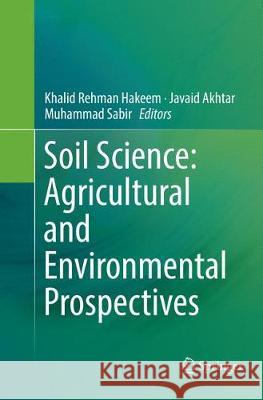Soil Science: Agricultural and Environmental Prospectives » książka



Soil Science: Agricultural and Environmental Prospectives
ISBN-13: 9783319817132 / Angielski / Miękka / 2018 / 430 str.
Soil Science: Agricultural and Environmental Prospectives
ISBN-13: 9783319817132 / Angielski / Miękka / 2018 / 430 str.
(netto: 688,46 VAT: 5%)
Najniższa cena z 30 dni: 693,97
ok. 16-18 dni roboczych.
Darmowa dostawa!
Dr. Khalid Rehman Hakeem (PhD) is working as a Fellow Researcher at the Faculty of Forestry, University Putra Malaysia (UPM), Serdang, Selangor, Malaysia and also a Visiting Professor at Fatih University, Istanbul, Turkey. He has obtained his MSc. (Environmental Botany) as well as PhD (Botany) from Jamia Hamdard, New Delhi, India in 2006 and 2011 respectively. He has conducted his Post-Doctorate research in the fields of Forest Dynamics and Plant Biotechnological studies from University Putra Malaysia from 2012-2013. Dr. Hakeem has more than 9 years of teaching and research experience in Plant Eco-Physiology, Biotechnology & Molecular Biology, Plant-Microbe-Soil interactions as well as in Environmental Sciences. A recipient of several fellowships at both national and international levels, Dr. Hakeem has so far edited and authored more than 16 books with international publishers, as well as more than 70 research publications in peer reviewed international journals, including 30 book chapters with international publishers. He is also an editorial board member and reviewer of several high impact international journals. Dr. Hakeem is currently engaged in studying the plant processes at ecophysiological as well as proteomic levels.
Dr. Javaid Akhtar (PhD) is working as a Professor of Soil Science, Director of Institute of Soil and Environmental Sciences, University of Agriculture, Faisalabad and Officer In-charge, Saline Agriculture Research Center, University of Agriculture, Faisalabad. He has obtained his MSc. (Hons) in Soil Science as well as PhD (Soil Science) from University of Agriculture, Faisalabad, Pakistan in 1986 and 1995, respectively. Dr. Akhtar has more than 25 years of teaching and research experience in Soil Science and Saline Agriculture. Prof. Akhtar has also to his credit more than 100 research publications in peer reviewed international journals, including 5 book chapters with international publishers and has edited 2 books with international publishers. He has supervised 12 Ph.D. and 70 M.Sc. (Hons) students. He is also regular recipient of research productivity award from Ministry of Science and Technology, Govt of Pakistan for his highly valuable research contributions. He has been awarded the Endeavour Executive Award for 2010 by Govt of Australia, XIIIth STARS Award 2002 by South Asia Publications.
Dr. Muhammad Sabir (PhD) is working as a Assistant Professor at the Institute of Soil and Environmental Sciences, University of Agriculture, Faisalabad, Pakistan. He has obtained his M.Sc. (Hons.) and Ph.D. in Soil Science from University of Agriculture, Faisalabad, Pakistan in 2002 and 2009, respectively. He worked as Post-Doctorate Research Fellow at Institute of Tropical Agriculture, University Putra Malaysia and University of Western Australia, Perth during the years 2012 and 2013, respectively. Dr. Sabir has more than 12 years of teaching and research experience in Soil and Environmental Chemistry, Remediation of Degraded Soil and Water Resources. Dr. Sabir has co-authored two books and has edited one book published by national and international publishers. He has also to his credit more than 30 research publications in peer reviewed international journals, including 10 book chapters with international publishers.
Soil is the most important natural non-renewable resource developed over a longer period of time due to weathering of rocks and subsequently enrichment of organic matter. Soil provides habitat for numerous microorganisms and serves as a natural medium for plant growth, thereby providing the plants with anchorage, nutrients and water to sustain the growth. Soil also serves as a universal sink for all types of pollutants, purifies ground water and is a major reserve of carbon in the universe. The role of soils to provide ecosystem services, maintenance of environmental/human health and ensuring the food security makes it as the most important and basic natural resource. Soil Science helps us to elaborate and understand how the soils provide all these services. Soil Science also provides us the basic knowledge dealing with the origin of the soil parent material, weathering of parent material and the formation of soils, morphological, physico-chemical and biological features of soils, classification of soils and role of soils in the provision and maintenance of ecosystem services, food security and environmental quality. This book encompasses the various processes, functions and behaviour of soils very comprehensively to acquaint the students of soil, plant and environmental sciences about their role to perform different agricultural and environmental functions.
1997-2026 DolnySlask.com Agencja Internetowa
KrainaKsiazek.PL - Księgarnia Internetowa









